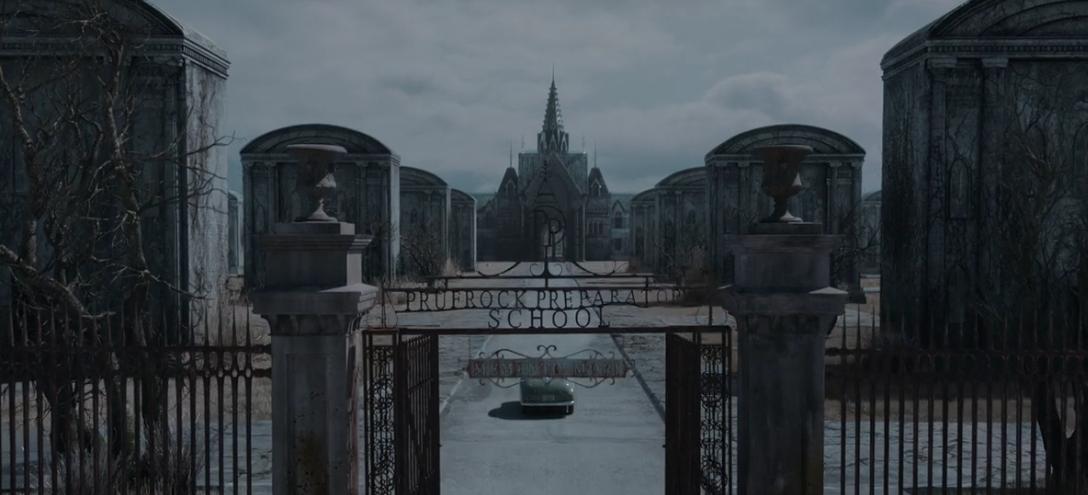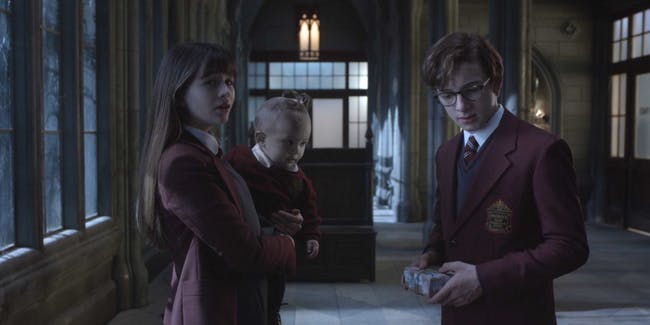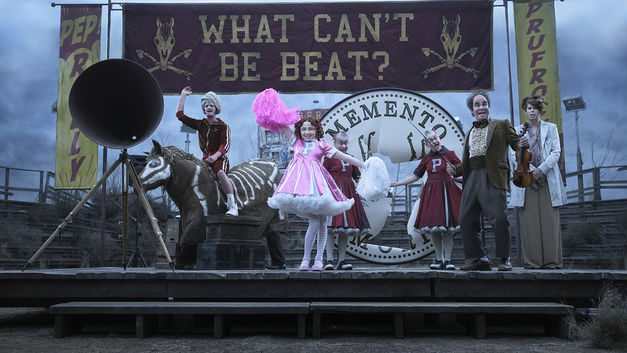A Series of Unfortunate Events has such a well-established patina that it takes no time at all to reacclimate to a new season. There’s no sense of unfamiliarity, because few shows on TV look like this one does, from the retro-futuristic Brazil-style office that Poe inhabits, to the perpetually decrepit houses and furniture, all primary colors faded to brown as if the color were being drained out of the world itself. For its occasional faults – and “The Austere Academy: Part One” is certainly emblematic of a few – Unfortunate Events has cultivated a look, and more importantly, a feel, all its own. Even the theme song (maybe the best of any Netflix show, save for maybe Unbreakable Kimmy Schmidt) is part of the show, as opposed to just an introduction.
“The Austere Academy: Part One” finds the Baudelaire siblings at Prufrock Preparatory School, which was introduced last season as the alma mater not only of the Baudelaire parents, but of Count Olaf, and Lemony Snicket himself. (The occasional reference to Snicket as a character and not a narrator could be one of Unfortunate Events‘ most clever, or most disastrous, ploys.) By now we know what to expect from this show: unfeeling adults, making the children’s lives worse, all while subjecting them to various forms of misery. And we certainly get that, but what struck me first is how much colder the show feels.
There are still moments of whimsy, or of cutesy indulgence, which are predictably hit or miss (Sunny as super baby has never been particularly amusing or interesting, but it’s an impossible trope to pull off; even The Simpsons fails in this regard). But there’s a nihilistic streak to the show which differentiates it from typical young adult fare. The motto of Prufrock is Memento Mori, Latin for “Remember you will die,” and the schoo’s vice principal is not only named Nero, but also fiddles – you know, to really drive the point home.
The new characters are a mixed bag. As Nero, Broadway legend Roger Bart is a hoot, his preening villainy masking a tangible sense of sadness. His drooping bowtie is reminiscent of John C. Reilly’s sad-clown attire as he sings “Mr. Cellophane” in Chicago. Bart knows that he’s most likely on the show for a scant two episodes, and he makes a suitably memorable impression. If the Baudelaires are going to be shuffled between villains instead of guardians this season – which would be a nice change of pace – then Nero is a good starting point. There’s a school bully as well, a Veruca Salt type named Carmelita Spats. Kitana Turnbull does a good job with the character, who she plays as a pint-sized Dolores Umbridge, but it’s a character we’ve seen before. As soon as we meet her, we know eventually she will wind up in league with Count Olaf.
The major new characters are the Quagmire siblings (we met their parents last season, played by Will Arnett and Cobie Smulders), Isadora and Duncan. They’re fine, if a little bland, but they’re basically clones of the Baudelaires, who can be pretty bland themselves. Sometimes Unfortunate Events makes one think that there’s a far more fascinating show happening in the margins. Nowhere is that clearer than in the character of Olivia Caliban, the school’s librarian, played with relish by Sara Rue. This show paints its good characters with the same broad strokes it uses for its villains, but Rue brings humanity, pathos, and humor to her role. It’s a low-grade thrill to watch her chuck books behind her back, landing them perfectly on the shelves and in the right spots. Unfortunate Events prizes competence above all else, which is why Olaf is the main villain. He has evil motives, yes, but we’re supposed to despise him because of his sheer ineptitude.
That could get in the way of perceiving him as an actual threat, were it not for Neil Patrick Harris’s performance. He doesn’t approach Olaf the way Roger Bart approaches Nero, for instance. Harris plays Olaf as the strutting peacock he is – more Bill the Butcher than Boris and Natasha. He’s funny, but Harris almost can’t help but be funny (notwithstanding his creepy turn in Gone Girl). What makes him effective, though, is that he doesn’t wink at the audience, and he racks up a decent body count. Harris leaves no room for doubt: if given the chance, he would kill the Baudelaires. Harris uses his lanky frame to maximum effect; Olaf is never not on stage, in his mind, and tellingly he assumes that the faculty of Prufrock will still be upset with him, although he was expelled after only a semester and a half. It is unthinkable that he would be forgotten, or anything less than a big deal.
Olaf infiltrates (a word he just learned) Prufrock, as he must, and while it’s always nice to see his coterie of hench-people, it does expose a flaw in the show’s storytelling. The story of the Baudelaires is both self-generating and finite. Olaf could conceivably chase them forever (there are thirteen books in the Unfortunate Events series), resulting in an eternal stalemate with the occasional change in scenery. For such an odd show, that doesn’t leave much room for surprise. It’s always fun to see Olaf pop up in one of his ridiculous disguises, but the one he chooses here is…ill-conceived, in that it involves Harris donning a turban and brownface to play “Coach Genghis.” The Southern drawl is a nice touch of absurdity, but the show really should have thought through that one better.
“The Austere Academy: Part One” isn’t a bad episode; it’s an episode of A Series of Unfortunate Events, and that alone is enough to make it stand out from the pack. I like the shift to a darker tone, and the writing is still as adept as ever; the dialogue is so flowery and playful that this threatens to become one of the most quotable shows on TV. Sure, the episode is more of the same, but when you’re talking about more of this show, that’s not always a bad thing.
4/5



